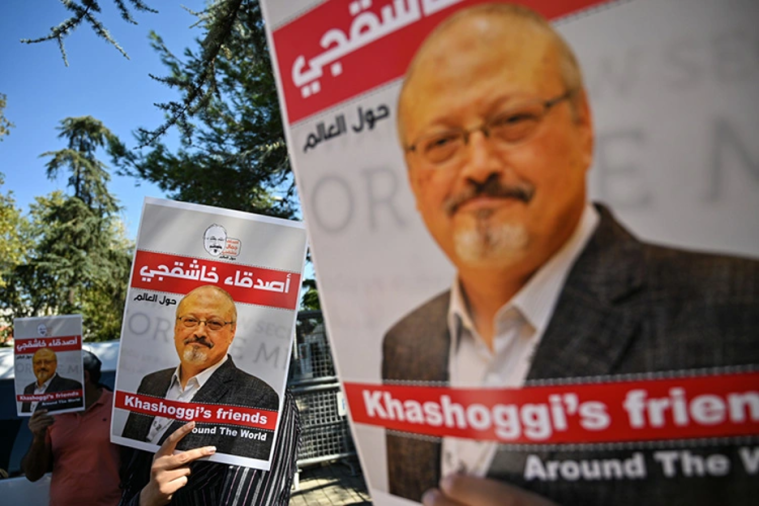In the week that CPJ reported a near-50% surge in the killings of journalists worldwide, the former head of the CIA and the U.S. State Department dismissed the reaction to one of the most brazen murders of journalists in the past half century as “faux outrage…fueled by the media.”
In his memoir “Never Give an Inch: Fighting for the America I Love,” Mike Pompeo calls the slain Washington Post columnist Jamal Khashoggi an activist – not a journalist.
In doing so, Pompeo echoes the routine belittling of the press by his former boss, President Donald Trump, who routinely sought to evade accountability by labeling any media digging into his actions “fake news.” One-time Trump lieutenant Steve Bannon went even further, accusing the media of being “the opposition.”
It’s one thing to be tagged the opposition in the United States, where the media enjoy a significant level of legal protection. It’s quite another to be targeted as a political opponent in a repressive monarchy such as Saudi Arabia which routinely imprisons journalists and human rights defenders.
Pompeo knows this but still he shamelessly went ahead with spreading what Washington Post publisher Fred Ryan called “vile falsehoods to dishonor a courageous man’s life and service…as a ploy to sell books.”
When U.S. public figures undermine journalism for political or economic gain, they send a message to leaders everywhere that journalists are fair game. Many repressive leaders heard that message and have seized on the fake news trope to crack down on the press. CPJ data backs this up — a record 363 journalists were imprisoned and 67 killed in 2022.
In the last 30 years, CPJ has documented that more journalists have been murdered for their reporting on subjects such as crime and corruption than are killed in crossfire covering conflict. And nearly 80% of those murders are never fully investigated and prosecuted to bring all responsible to justice. Khashoggi’s disappearance after he entered the Saudi consulate in Istanbul in 2018 is one such case. Khashoggi, who criticized de facto Saudi ruler Crown Prince Mohammed bin Salman in his newspaper columns, was murdered and butchered in the diplomatic mission. His remains were never recovered.
There are few people who know what went on in that consulate and who ordered that murder better than Pompeo. He was director of the CIA which, with other US intelligence services, investigated the crime and concluded that the Crown Prince was behind the assassination.

Even so, Pompeo claims Khashoggi was not a “real” journalist but a partisan. Pompeo questions the columnist’s allegiances and even adds that he worked only part-time as a stringer.
“To be clear, Khashoggi was a journalist to the extent that I and many other public figures are journalists. We sometimes get our writing published, but we also do other things. The media made Khashoggi out to be a Saudi Arabian Bob Woodward who was martyred for bravely criticizing the Saudi royal family through his opinion articles in the Washington Post.
“In truth, Khashoggi was an activist who had supported the losing team in a recent fight for the throne,” writes Pompeo.
Pompeo acknowledges the “grotesque butchery” of the murder but adds that the killing: “wasn’t surprising – not to me, anyway. I’d seen enough of the Middle East to know that this kind of ruthlessness was all too routine in that part of the world.”
Pompeo must know that dictators like to blur the distinction between journalism and activism. In many countries, merely asking a probing question of a powerful political leader or businessperson can be viewed as hostile. Jails from China to Cuba are filled with reporters who had the temerity to hold power to account and follow the old journalistic precept of afflicting the comfortable and comforting the afflicted.
Authoritarian governments love Pompeo’s distinction between journalist and activist because it gives them cover to introduce press licensing systems that reward adherence to the government line and punish troublesome outlets and individuals by denying publishing and broadcasting permissions, press cards, and access to public information.
If people gather and distribute news or publish fact-based commentary or opinion, then they are carrying out acts of journalism. If they are persecuted or prosecuted for those acts it doesn’t matter whether they conform to any government or union definition of who is or is not “a journalist.”
The U.S. media have reported that Pompeo is eyeing a presidential run next year and that the memoir is part of the build up to that.
Bashing the U.S. media and portraying Mohammed bin Salman as a progressive reformer may be part of Pompeo’s strategy. But attacking the reputation of a fearless commentator in this way is a dangerous disservice not just to Khashoggi’s memory, but to the thousands of journalists around the world who every day risk his fate just to bring us the news.
Robert Mahoney is CPJ’s director of special projects and a former executive director of the organization. He writes and speaks on press freedom, and has led CPJ missions to global hot spots from Iraq to Sri Lanka. He worked as a reporter, bureau chief, and editor for Reuters around the world. Follow him on Twitter @RobertMMahoney.
